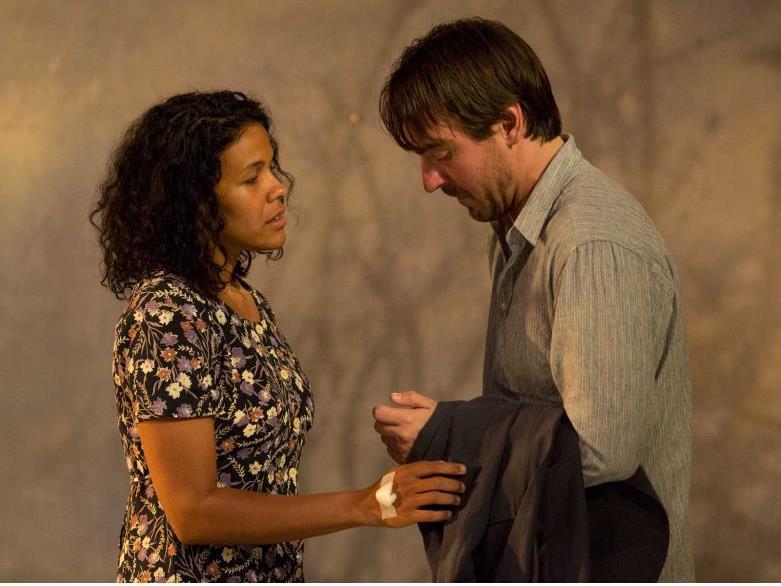Zahra Newman (Anna) and Ewen Leslie (Ivanov) in Ivanov; Photo by Brett Boardman.
Eamon Flack’s adaptation of Ivanov is sublime. It’s also totally ridiculous. Silliness and hilarity swirl around a complex depiction of depression. A raft of impotent, decaying male characters lament lost pasts while one full of machismo steals the present. The artlessness of the upper class Russian women is offset by the class and dignity of Ivanov’s poor, suffering, foreign wife Anna. The strident moral tone struck by the local doctor is balanced by the moral ambiguity of the play itself. Personal stories of futility are set against a backdrop of political stagnation. All these intricacies are testament to an important aspect of Chekhov’s philosophy, espoused in the play by Ivanov’s uncle Shabelsky: ‘I attacked the structures, the culture, but I never forgot that we were dealing with people. I never lost my love of the spun web of human thought and feeling, imperfect, fragile, in constant need of care.’
Nikolai Ivanov is at the centre of things, but his world is crumbling around him. At 35, Ivanov is an ‘intelligent, well-educated man…rolling downhill’. Once full of energy and drive in his careers of teaching and writing, Ivanov’s tragic circumstances are destroying him. In debt to his neighbours, he lives penniless and jobless on an old farm with his wife Anna who is terminally ill. The play follows his descent into a darker and darker depression on the farm and his attempts to escape this spiral in a love affair with his much younger neighbour Sasha.
The performances are uniformly excellent, starting with Ewen Leslie as Ivanov. He is immensely captivating both as a hollow man, ‘I feel-no love, no pity. Just. Emptiness’ and as a man filled with amusing self-loathing, ‘I’m like all those boy-men, bearded idiots wallowing in their own purposelessness with expensive pants and completely uninteresting Hamlet complexes’. Zahra Newman is perfect as the play’s anchor of integrity, her stoic suffering making her explosion in Act III all the more powerful. John Howard is wonderful as the caring but downtrodden neighbour Lebedev, resigned to his life under the thumb of his wife Zinaida: ‘every second night I dream my penis falls off in the shower’. Helen Thomson as Zinaida and Blazey Best as her friend Marfa Babakina are funnier versions of Kath and Kim with a significantly better grasp of economics. John Bell brings wisdom to uncle Shabelsky while Fayssal Bazzi brings a magnetic and vital attention-seeking energy to cousin Borkin’s every scene. Airlie Dodds enlivens Sasha with her naive girl next door oratory about ‘active love’, Yalin Ozucelik is appropriately indignant as the overzealous moral compass Dr Lvov, and Mel Dyer is hilarious as the local caterer Gabriella.
The way Flack has updated this 1887 Chekhov play is masterful. He is helped by the timeless nature of critical themes in the original, which Flack summarises in the program as ‘money, cultural inanity, international politics, an inability to talk about death, the stalling of a socially conscious political agenda’. He turns the latter of these into a sharp critique of contemporary politics, particularly in Shabelsky’s speech reflecting on his youth in the 1960s in Act One: ‘It was not capitalism, it was not market liberalism, it was public good that did it for me. I was the child of Progress. Do you know this word? It’s what we used to talk about before we talked about growth.’ Flack is never too earnest or heavy-handed in his critique, adding lashings of humour with Babakina’s byzantine economic analysis and Lebedev’s dissection of Western political economy as ‘the hairier the men in charge the worse the long-term outlook.’
Much of the success of Ivanov can be traced back to Flack’s wonderfully light, silly touch, and it’s beautifully augmented by the production’s technical aspects. Michael Hankin’s open and expansive set is a great canvas for the fast-paced, multi-character movement of many scenes. The set for the Lebedevs’ home is striking, comically adorned with similarly framed photos of family members and Vladimir Putin, along with a ridiculous forest of indoor plants. Mel Page’s costumes are similarly playful, particularly Zinaida’s white pantsuit and Borkin’s surprise tracksuit. Elaborate scene transitions are smooth and entertaining thanks to Steve Toulmin’s composition of Russian versions of iconic songs, most memorably the Rustralian National Anthem replete with a framed photo of PM Turnbull. Verity Hampson’s lighting design nicely illuminates both the lightness of Flack’s vision and the darkness of Ivanov’s soul.
This production of the Russian playwright’s first completed play is magnificent. It’s clear that not just Chekhov but Flack, Leslie and the whole Ivanov team have a keen sense for the ‘spun web of human thought and feeling, imperfect, fragile, in constant need of care’.
4 ½ stars out of 5
Ivanov
Belvoir St Theatre, Surry Hills NSW
By Anton Chekhov
Adapted and Directed by Eamon Flack
Set Designer: Michael Hankin
Costume Designer: Mel Page
Lighting Designer: Verity Hampson
Composer and Sound Designer: Steve Toulmin
Cast: Fayssal Bazzi, John Bell, Blazey Best, Airlie Dodds, Mel Dyer, John Howard, Ewen Leslie, Zahra Newman, Yalin Ozucelik and Helen Thomson
19 September – 1 November





